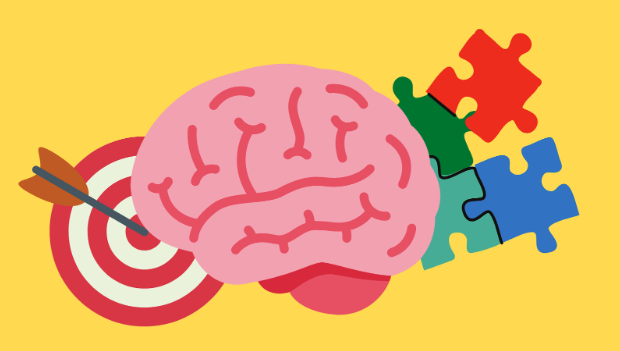A part of me died on July 22, 2017.
I spent the day after my 15th birthday in a psychiatry office undergoing test after test. Every kid wants to be told that they’re special, but that’s not what my psychiatrist or teachers told me. They told me I was “neurodivergent.” I’d finally hit the 99th percentile on a test — for a mental disorder. Soon after my diagnosis, I became a mere shadow of the talkative and energetic girl I once was. What changed? My brain chemistry.
I was late to the cognitive disorder game. I didn’t know I had attention-deficit/hyperactivity disorder until I began my sophomore year of high school. My algebra one teacher, along with other teachers and faculty at my boarding school, cited my inability to concentrate and sit still as possible signs of ADHD. They told me that I owed it to my peers to focus better because I posed a distraction to those around me. So, I went and got tested for the sake of myself and my peers in an attempt to rectify what I’d been told wasn’t “normal.” After my diagnosis confirmed their suspicions, my psychiatrist put me on a very high dose of medication. Although I excel in school now, the issue still stands: I don’t feel normal.
Pressure from others and the expectation to be more normal forced me to get a diagnosis and get medicated — a choice that altered my personality for the worse. There is no longer as much inflection in my voice. Sometimes it even feels like my emotions are flatlining while my body is mindlessly moving in habitual motions. Yet, I’m technically doing better according to societal standards.
The current structure of the United States education system heavily regulates and stigmatizes students with ADHD. When authority and educational figures place children with ADHD in different classrooms and label them as “troublemakers” as early as elementary school, they make those living with cognitive disorders feel uncomfortable and unworthy. These patterns of being excluded and differentiated continue from elementary school to college and even into adulthood.
From first-hand experience, stigmatization forces those with ADHD to make the burdensome choice of whether or not to medicate. Consequently, people like me find themselves in a lose-lose situation. On one hand, medication helps students with ADHD focus in class and may help to shake the “troublemaker” label but can make other aspects of life — such as sleeping, eating and socializing — difficult. On the other hand, those who opt not to medicate to avoid unnecessarily harsh chemicals and personality changes are constantly pressured to behave “normally” like the neurotypical peers they must work endlessly to keep up with, such as maintaining the GPAs and standardized test scores that supposedly pave the way to a good future. Students with ADHD must medicate to excel because our future within a capitalist society requires us to do so — starting with getting into top universities. Although one might assume that medication evens the playing field, at least in the classroom, the mental and emotional strain that medication places on students can do more long-term harm than immediate good.
I sometimes wonder where and who I’d be if I’d been given another more holistic treatment for my behavioral health.
In fact, those who choose to medicate often get tired of the stress and adverse effects, eventually attempting success while unmedicated. One study investigated why most people with ADHD stop medication at least once; it found that most stopped due to adverse side effects, the stigmatization of ADHD as a disorder and challenges accessing services ranging from school accommodations to continued psychiatry.
I, for one, have tried to stop medication. It is true that in high school, I couldn’t have been happier about my jump from a freshman 3.4 GPA to a senior 4.0 GPA. But I’ve realized that being happy about a grade doesn’t equate true happiness. I’ve cycled through different stimulants attempting to preserve my personality while succeeding academically. After I failed at the former, I stopped taking my medication. When I started college, I quickly resumed taking medication and have maintained a 4.0 since. I sometimes wonder where and who I’d be if I’d been given another more holistic treatment for my behavioral health.
Kids struggling with ADHD should be made aware of other possible avenues available to them. While the CDC reports that 10% of U.S. citizens have ADHD, those using behavior treatment is 62% compared to 81% taking medication. Data from a study in the Journal of Clinical Child & Adolescent Psychology supports practicing behavioral treatment first and adding small doses of medication if needed for optimal development in ADHD children. Realistically, we should stop turning to stimulants, which are controlled substances, as the automatic go-to for treating children with ADHD.
In an interview I conducted with Long Island Jewish Medical Center child and adolescent psychiatrist Dr. Vera Feuer, she revealed her personal belief that ADHD stimulants are overprescribed.
“I do think there’s an overuse of medication,” Feuer said. “ADHD is a norm. It’s a spectrum so at what point does it truly become a disorder?”
So, if there is an alternative to medicating children, why shouldn’t we try it?
The education system fails students like me by categorizing us separately from our peers instead of advocating for a more inclusive model that doesn’t require students to sit still for hours at a time. Additional support systems are provided through accommodations for students with ADHD, including extra time on tests and separate spaces to maximize focus. As a transfer student, I receive both time-and-a-half and distraction-reduced testing at Vanderbilt just as I had at my previous school, Boston University — and these accommodations have set me up to do my best on my exams. That being said, not all students with ADHD have the resources and documentation required to get these accommodations, because not only do we need a diagnosis, but we are also required to get a new one every four years. I was unable to get accommodations for the SATs because my diagnosis has “expired.” Many are not even able to get their first diagnosis, so making people get renewed diagnoses not only implies that ADHD itself expires, but also further privileges certain people while leaving others behind. It is a long process that requires the patient, their parents, their psychiatrist and their teachers. Some do not have the resources nor the time required to complete this extensive process that can lead to additional expenses.
The education system fails students like me by categorizing us separately from our peers instead of advocating for a more inclusive model that doesn’t require students to sit still for hours at a time.
Because my diagnosis was “expired” while I was in high school, I wasn’t granted accommodations until I started at Boston University. I struggled throughout high school and had to take the SATs without accommodations. I remember sitting in the testing room; my anxiety was eating me alive until I had to randomly select answers I didn’t get to in time. As a result of my poor and uncharacteristic score, I wasn’t able to gain acceptance to colleges I was interested in.
If my diagnosis expires in four years, surely the current education system is beyond its “Best if used by” date. We need to change the infrastructure to offer more support rather than medicating children.
At Dr. Feuer’s advice, I researched Finland’s education system to see how it stacks up against our own. I found the Finnish school structure to be more supportive of neurotypical kids and overall more enjoyable for more children. Kids don’t start school until they are seven years of age. The Washington Post reported that they also enjoy 75-minute recesses, whereas the average recess time in the U.S. is 27 minutes. According to the New York Times, students aren’t graded for the first six years of school and are only required to take one standardized test at sixteen years old. Teachers foster relationships with their students over a five-year period rather than one year, whereas teachers in the U.S. are only in the students’ lives for a semester to a year. Because Finnish teachers are in their students’ lives for much longer, they build strong bonds and develop a heightened understanding of how to assist in each child’s growth and development. The stability, support and security seen in Finnish schools is just what is needed for students with ADHD.
Both the stigma around ADHD and the medication prescribed for it pose problems for those who already have more to deal with than they signed up for. Ridding the education system of this embedded stigmatization would benefit all students — not just those with ADHD — academically and mentally. By changing the way we think about kids with ADHD in school, the U.S. has the potential to make great strides in adolescent health and improve the lives of millions of children. If we want future generations to thrive in this country, inclusive education is the first place to start.








